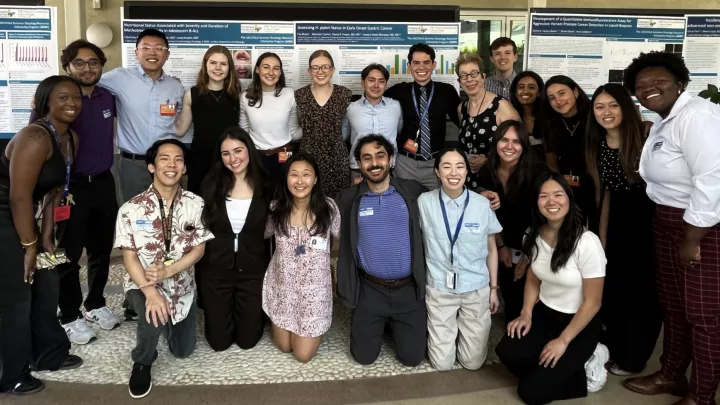
Mark Frey, PhD
Dr. Frey joined CHLA’s Division of Pediatric Gastroenterology, Hepatology and Nutrition in 2010. He is an internationally recognized expert in the cell-cell signaling mechanisms that control regeneration in the intestine after injury. His primary research focus is on how growth factor-initiated signals dynamically regulate the balance of stem and differentiated cells in the lining of the gut, and how this balance is disturbed in inflammatory bowel disease. Dr. Frey will continue to serve in his other leadership positions as Director of the CHLA Samuels Family LA-HIP Program and Director of the USC PIBBS interdisciplinary PhD program.
Dr. Frey works with multidisciplinary DBRM faculty to facilitate leading-edge research into the developmental origins of childhood disease, advance the potential of stem cell-based therapeutic approaches and provide an outstanding environment for training students and fellows. This also includes bringing the bench to the bedside through collaboration with patients, families and clinicians with healthcare journeys that include the diagnoses that the team studies.
Publications
Al Alam, D., Sala, F.G., Baptista, S., Galzote, R., Danopoulos, S., Tiozzo, C., Gage, P., Grikscheit, T., Warburton, D., Frey, M.R., and Bellusci, S. 2012. FGF9-Pitx2-FGF10 signaling controls cecal formation in mice. Dev Biol. 369:340-8.
Bernard, J.K., McCann, S., Bhardwaj, V., and Frey, M.R. 2012. Neuregulin-4 is a survival factor for colon epithelial cells both in culture and in vivo. JBC. 287:39850-8.
Yamaoka, T., Frey, M.R., Dise, R.S. and Polk, D.B. 2011. Specific epidermal growth factor receptor autophosphorylation sites promote chemotaxis of colon epithelial cells. Am J Physiol Gastro Liver Physiol. 301(2):G368-76. PMC3154598.
Hilliard V.C., Frey M.R., Dempsey P.J., Peek R.M. Jr and Polk DB. 2011. TNF-alpha converting enzyme-mediated ErbB4 transactivation by TNF promotes colonic epithelial cell survival. Am J Physiol Gastro Liver Physiol. 90(10):1415-24. PMC2947587.
Hobbs, S.S., Goettel, J.A., Liang, D., Yan, F., Edelblum, K.L., Frey, M.R., Mullane, M.T. and Polk, D.B. 2011. TNF transactivation of EGFR stimulates cytoprotective COX-2 expression in gastrointestinal epithelial cells. Am J Physiol Gastro Liver Physiol. 301(2):G220-9. PMC3154604.
Frey. M.R., Carraro, G, Batra, R.K., Polk, D.B. and Warburton, D. 2011. Sprouty keeps bowel kinases regular in colon cancer while miR-21 targets Sprouty. Cancer Biol Ther. 11:112-114.
Frey, M.R., Hilliard, V.C., Mullane, M.T. and Polk, D.B. 2010. ErbB4 promotes cyclooxygenase-2 expression and cell survival in colon epithelial cells. Lab. Invest. 90(10): 1415-24. PMC2947587.
Rosen, M.J., Frey, M.R., Washington, M.K., Chaturvedi, R., Kuhnhein, L.A., Matta, P., Revetta, F.L., Wilson, K.T. and Polk, D.B. 2010. STAT6 Activation in Ulcerative Colitis: A New Target for prevention of lL-13-lnduced Colon Epithelial Cell Dysfunction. Inflammatory Bowel Diseases. 17(11):2224-34. PMC3120916.
Research
Mark Frey, PhD, studies the molecular mechanisms that drive intestinal repair after injury or inflammation. His research program in the Saban Research Institute at Children's Hospital Los Angeles is focused on the involvement of ErbB receptor tyrosine kinases and their cognate ligands in the intestinal response to injury, intestinal inflammation and colitis-associated carcinogenesis.
Visit the Frey Laboratory.
Current Funding
NIH R01DK095004: Regulation of Colon Epithelial Cell Survival by NRG4-ErbB4 Signaling.
This project is designed to test the hypothesis that down-regulation of NRG4 worsens colitis, and thus exogenous NRG4 treatment may improve colitis by activating anti-apoptotic signaling in colon epithelial cells.
American Cancer Society Research Scholar Grant: The role of ErbB4 in colon cancer.
This project is designed to test the hypothesis that misregulated ErbB4 expression promotes human colorectal cancer cell survival and metastasis.
Media
KNX News - Chuck Lorre Family Foundation pledges $10M to Children's Hospital Los Angeles
Science Daily - Controlling Cell Turnover in the Intestinal Lining
Daily RX News- The Importance of the Intestinal Lining
Fox News- Breast milk may be protective against devastating intestinal disorder found in infants
MedicineNet.com- Breast Milk May Protect Against Deadly Newborn Disease
CHLA Blog
A Clearer Picture of Inflammatory Bowel Disease (IBD): A Foundation for Newer Treatments


